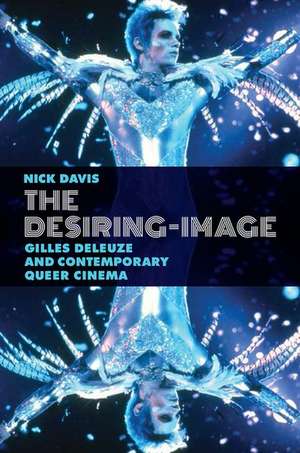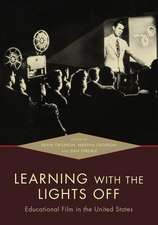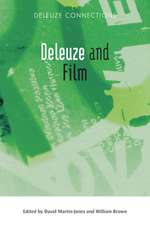The Desiring-Image: Gilles Deleuze and Contemporary Queer Cinema
Autor Nick Davisen Limba Engleză Paperback – 18 iul 2013
| Toate formatele și edițiile | Preț | Express |
|---|---|---|
| Paperback (1) | 310.81 lei 31-37 zile | |
| Oxford University Press – 18 iul 2013 | 310.81 lei 31-37 zile | |
| Hardback (1) | 687.29 lei 31-37 zile | |
| Oxford University Press – 18 iul 2013 | 687.29 lei 31-37 zile |
Preț: 310.81 lei
Nou
Puncte Express: 466
Preț estimativ în valută:
59.47€ • 62.26$ • 49.21£
59.47€ • 62.26$ • 49.21£
Carte tipărită la comandă
Livrare economică 25-31 martie
Preluare comenzi: 021 569.72.76
Specificații
ISBN-13: 9780199993161
ISBN-10: 0199993165
Pagini: 330
Ilustrații: 15 halftones
Dimensiuni: 155 x 231 x 23 mm
Greutate: 0.48 kg
Editura: Oxford University Press
Colecția OUP USA
Locul publicării:New York, United States
ISBN-10: 0199993165
Pagini: 330
Ilustrații: 15 halftones
Dimensiuni: 155 x 231 x 23 mm
Greutate: 0.48 kg
Editura: Oxford University Press
Colecția OUP USA
Locul publicării:New York, United States
Recenzii
The Desiring-Image is high concept: it adds a third term to 'movement-image' and 'time-image,' extending Deleuze's inquiry into present-day world cinema and making his pair of cinema books a trilogy. It is also high theory. Yet Davis's book is also concrete and accessible, explaining and synthesizing Deleuzian terminology and illuminating key works of New Queer Cinema in ways that renew their promise for critical inquiry, pedagogy, and film culture. The clarity of Davis's prose does not diminish the text's rhetorical performance, which is sustained and often dazzling.
This is important and needed work. Davis' deeply original move is to fold Deleuze's film concepts into the Anti-Oedipus and to remap them, and in so doing to produce a distinctly original perspective for assessing and revaluing the films that inspire him. The Desiring-Image has renewed and extended Deleuze's concepts in ways that will encourage the formation of new perspectives and forms of analysis for cinema, queer or otherwise.
The Desiring-Image brings an exciting new perspective on film and desire. Impressive, at times startling in its groundbreaking originality, The Desiring-Image will stimulate anyone interested in how cinema produces the desire which shapes the worlds we inhabit.
At its best, Nick Davis' The Desiring-Image thinks through Deleuze to explode our conception of the queer cinema canon, to challenge our understanding of homoeroticism, and to consider the ways queer cinema imagined itself in retrospect. This is an exhaustive yet lovingly written perverse intervention into film theory.
Seductive in its intellect and humbling in its prose, The Desiring-Image marks an important new entry into queer film studies and film theory more broadly. Queering Deleuze and 'deleuzing' queer film, Nick Davis' 'deterritorializing' treatise revives the radicalism and hope of both new queer cinema and the scholarship surrounding it.
This is important and needed work. Davis' deeply original move is to fold Deleuze's film concepts into the Anti-Oedipus and to remap them, and in so doing to produce a distinctly original perspective for assessing and revaluing the films that inspire him. The Desiring-Image has renewed and extended Deleuze's concepts in ways that will encourage the formation of new perspectives and forms of analysis for cinema, queer or otherwise.
The Desiring-Image brings an exciting new perspective on film and desire. Impressive, at times startling in its groundbreaking originality, The Desiring-Image will stimulate anyone interested in how cinema produces the desire which shapes the worlds we inhabit.
At its best, Nick Davis' The Desiring-Image thinks through Deleuze to explode our conception of the queer cinema canon, to challenge our understanding of homoeroticism, and to consider the ways queer cinema imagined itself in retrospect. This is an exhaustive yet lovingly written perverse intervention into film theory.
Seductive in its intellect and humbling in its prose, The Desiring-Image marks an important new entry into queer film studies and film theory more broadly. Queering Deleuze and 'deleuzing' queer film, Nick Davis' 'deterritorializing' treatise revives the radicalism and hope of both new queer cinema and the scholarship surrounding it.
Notă biografică
Nick Davis is Assistant Professor of English and Gender & Sexuality Studies at Northwestern University.














